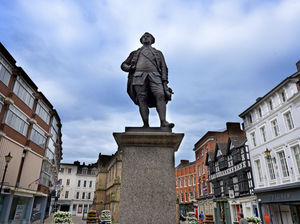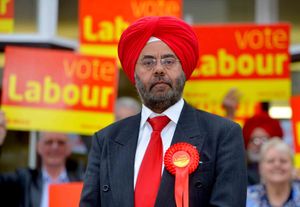Open letter: Former council leader calls for Shrewsbury's Robert Clive statue to be put in museum
A former leader of Telford & Wrekin Council has written an open letter to other councillors in Shropshire asking for Shrewsbury's statue of Robert Clive to be placed in a museum.

Telford & Wrekin councillor Kuldip Sahota owned various businesses in Shrewsbury town centre for 20 years,
There has been much debate over the statue of ‘Clive of India’ in the town’s Square. Petitions have been circling, with some wanting the statue to be removed and others wanting it to stay.
Clive played a key role in conquering swathes of India for the East India Company in the mid-18th century.
Corruption and looting saw him amass a huge amount of wealth and after returning to Britain he was made Baron Clive of Passey, knighted and became Shrewsbury’s MP, a position he held until his death.

In his open letter, Councillor Sahota writes: "I’d like to make it quite plain right from the outset that I’m a strong supporter of business and enterprise, as well as those who have made their money through such means. After all, I am a businessman myself.
However, I do have an issue with those who acquired their wealth through unscrupulous means, bribery, and extortion and by creating famine in which millions of poor people were starved to death.
"Robert Clive, whose statue has stood proud in Shrewsbury Square for the last 160 years, became wealthy through such means while working for the East India Company. He made his fortune, along with other East India Company employees, from other people’s misery."
Inequality
Councillor Sahota added: "Do we really want to say to our children: 'That is the statue of Robert Clive, who looted and plundered his way through India in the 18th century and starved millions of poor people to death, and the reason we have his statue up there is because this is our history and heritage'?
"Do we really want the values of inequality of the mid-18th century imposed on our children - when human life was cheap and the might of the sword ruled - when words such as equality and human rights were anathema to our rulers - when certain Englishmen held deep loathing for the others and when people of colour were considered sub-human? We have made massive strides in progress over the last two and a half centuries, and our world is much better and richer for that.
See also:
"I hope you will consider this carefully from the collective viewpoint of our communities as a whole, and not just from the perspective of privilege as can often be the case.
"Statues in public place are for us to look up to them and admire them for their heroic and humanitarian deeds and then be inspired by their work. We are quite literally putting them on a pedestal. I am sorry to say that there is nothing inspirational about this statue.
"Please remove this anachronism from the square and place it in one of the many Shropshire museums, where it can be given greater context in light of Clive’s own life and the heinous actions of the East India Company."
Petitions:
In brief: Who was Robert Clive?
Clive was born on the Styche Hall estate, near Market Drayton, in 1725 and went to school in London before travelling to India with the East India Company in 1743.
After two years in Britain, in 1755 Clive returned to India and two years later retook Calcutta (now Kolkata) for the company at the Battle of Plassey, a key moment on Britain's path to controlling Bengal and then India for almost two centuries.
Corruption and looting saw Clive amass a huge amount of wealth and he returned to Britain in 1760, aged 34.
He was made Baron Clive of Passey, knighted and became Shrewsbury's MP, a position he held until his death.
He went back to India in 1765 for two years before returning to Britain where the activities of Clive and the East India Company in India came under sustained attack.
The famine of Bengal that lasted between 1769 and 1773 and killed around a third of the region's population was said to have largely been caused by the company's policies.
Clive defended himself in Parliament, saying "I stand astonished at my own moderation," and in 1773 Parliament declared that he did “render great and meritorious services to his country.”
He died at home in London aged 49 and is believed to have killed himself.





